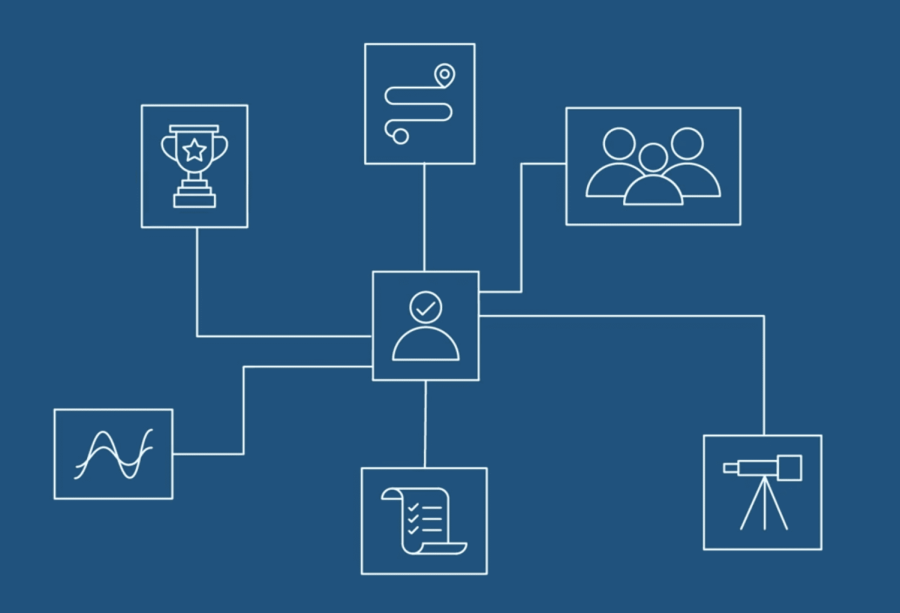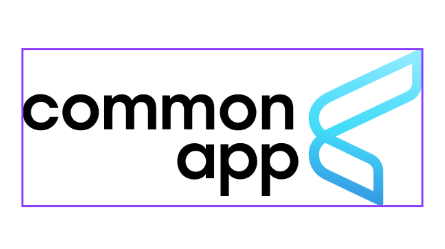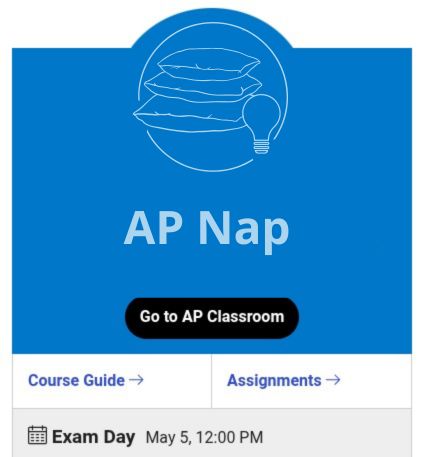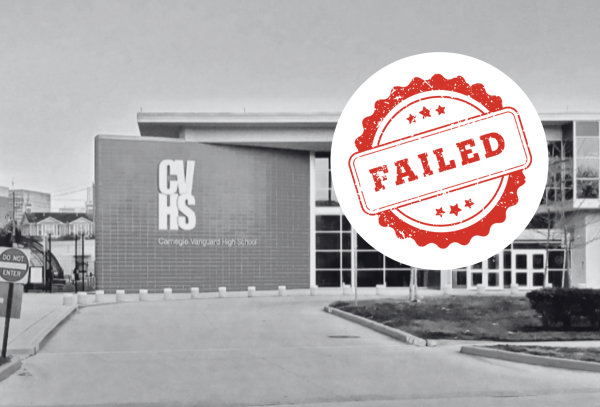Hope nothing lessons your dreams
Visual representation of factors to consider when applying for college.
In elementary school, one of the first activities a teacher would pass out would be one of those beginning of year introduction papers, with “In the future, I want to be…” in bright, bold letters at the top. All your classmates would write the classics: doctor, teacher, firefighter or whatever job their parents worked at. Then, there’s probably you, your friend or the “weird kid” in class who thought inspecting mirrors would be a job they saw themselves doing. That only goes to show the plethora of career paths presented to the underdeveloped brains of children.
How can they trust kids to make such big decisions when they don’t even know the Pythagorean theorem? The equation is applied to practically every instance of life. If they don’t know what they need to know now, they can’t be expected to make futuristic decisions either.
Even in middle school, when students are first tasked with the decision to choose electives, they’re forced to consider the consequences of their actions. Should they immediately go into courses that pave a path towards their current desired occupation? Or is the better option to test the waters and see what they really like?
For future students’ sake, provided below is a list of everything worth considering when regarding occupational decisions in the future.
1. What if your job is insignificant compared to technology?
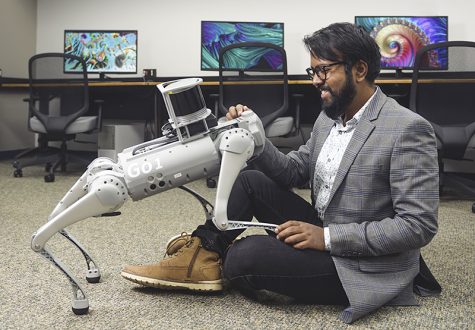
Now imagine someone picking a career path that they enjoy, only to be replaced by AI five years in. That someone could be you. The COVID-19 pandemic pushed companies to invest in AI, meaning trillions of people will have to find new roles in their industry. First, the pandemic takes away parts of your preteen or teenage years; next, it’ll be the root cause of adversity in the future.
On the other hand, if you’re the unfortunate soul who watches their colleagues leave, you might find yourself working nine to five in colorless cubicles, except the next-door neighbor is a robot, and all you hear is a robotic voice asking you to oil them every 10 squeaks. Thus, Entrepreneur concluded that creation of brand-new occupations, such as a robot oiler, will be necessary in this tech-driven economy.
2. What if you end up drowning in debt due to your initial major decision? (Get it? Like college major?)
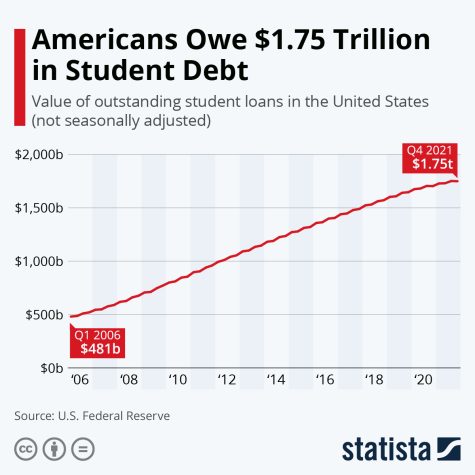
Entrepreneur continues to discuss how the lack of a college degree makes one’s job pool smaller, but the costs of tuition don’t make college any more appealing. Not only are college courses expensive, spending money on ones that don’t apply to your degree only increases the weight on your shoulders.
The Vector Impact found that the average person goes through five to seven career changes in his or her lifetime. This means that you’re bound to have moments when you ask yourself if you’re on the wrong path, yet many changes are not only costly, but also extremely risky. You could end up changing majors and applying for new courses, only to want to change it again. Then, you might find yourself in an endless cycle of uncertainty, debt and frustration.
3. What if you only settle for a socially acceptable, financially stable career?
Nowadays, university education is more than a place to learn what you’re passionate about; it’s almost like a requirement to succeed in this ever-evolving economy. What if you worked all your life to become a professional fisherman, only to find that you can’t survive off of your net income?
For all you know, your interests now could cause you to apply for the wrong major, and the wrong major could cause you to land in the wrong industry, and the wrong industry with zero passion could lead to an unhappy life, and an unhappy life means your hopes and dreams are going to crash and burn. You might end up sleeping in a solo apartment surviving solely off ramen and the company of your cat that has more of a life than you.
4. What if everyone looks at you differently if you don’t go?
Sure, there are many stories of flourishing individuals who never gained a college degree, but that has little impact on societal and parental beliefs. There will always be those classmates that are confident in their future, adding pressure to the idea that you must be like that, and parental figures who want you to become a doctor or lawyer just to be able to boast about their child at family gatherings.
There’s a seemingly endless college-for-all message to all students; what are the consequences of failing to abide by such standards? You could always choose to ignore what other people think, constantly living in fear of proving them right. Say you spend all your life practicing becoming a world-renowned musician, only to find that you’re not noteworthy. What would you do then? You’ll find yourself sitting on the living room couch, hearing the “I told you so” speech for the 10th time that week.
5. What if you lose yourself trying to take a job you don’t like?
HBR psychologists use the term “enmeshment” to describe a situation where the boundaries between people become blurred and individual identities lose importance. Now, on most occasions, high pressure jobs directly correlate with high pay, so should we stray away or work towards? What if you’re unable to balance work life and social life and end up being a lifeless work zombie working with one hand on a keyboard and the other on an oil can?
People can get so immersed in their work lifestyle that all they know is work. Next thing you know, you’re at your high school reunion unable to remember a single time in the past decade that you did something interesting. Maybe you tried to become a chef, figuring it would add a little spice to your life, only to realize that you didn’t have the thyme nor the instructions on how to put out a fire. Even worse, you might be stuck trying to decide between what you know and love and a new opportunity halfway across the world.
6. What if we skipped the deciding phase and just went with the flow?
If you apply with whatever seemed doable as your major, you could find yourself sad and depressed because your job is boring and the only thing keeping you awake is the robot that won’t stop repeating “battery low.” If the hypothetical “right choice” exists, you may never know. You could have spent your whole life studying to become a historian, only to realize that there’s no future to it.
The Vector Impact tells its readers, “If it’s time for you to take your Legos and move to a different playground, so be it.” While costly, changing degrees is likely the best choice if you still want to do something you’d actually enjoy, but what if the other kids already took all the Legos because you were too slow? HBR even discusses how age discrimination can make it especially difficult for those in the mid to late stages of their career to find a suitable role in their field after a layoff. If you don’t start fresh, you may never catch up to the hare.
The bottom line is that if you’re unsure about your career choice, you just be doomed for life. Decision making for your future can be overwhelming and cause plenty of overthinking, so yes, it could very well be the end of the world.
This story is satire.
Your donation will support the student journalists of Carnegie Vanguard High School. Your contribution will allow us to cover our annual website hosting costs and fund field trips, competition fees, and equipment. We appreciate your support!

Cat is a sophomore on the Carnegie competitive dance team and enjoys reading, more specifically fantasy genres, and writing in their free time. They also...


